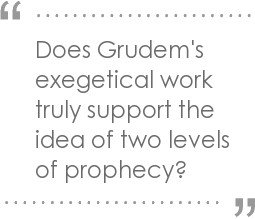What Is a Prophet?
A draft excerpt from the book “The Words of the Covenant” (forthcoming, DV)
It is commonly asserted within biblical scholarship that the main focus of the prophet was on proclamation; that only incidentally was he (or she) concerned with prediction. In many studies of the role of the prophet the emphasis is put upon the prophet’s function as a moral exhorter to his time and place. Here is a recent example:
The prophet’s role was to speak the word of God to the king, nation, or people to reveal his will for their lives and how they should act. Prophecy sometimes included predictions, but always with a view to revealing something of God’s plan, nature, or personality so that the hearers would respond appropriately in worshipful obedience.1






 (Originally posted in April of 2011)
(Originally posted in April of 2011)
Discussion